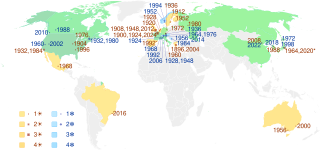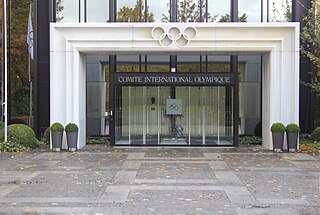 W
WThe all-time medal table for all Olympic Games from 1896 to 2018, including Summer Olympic Games, Winter Olympic Games, and a combined total of both, is tabulated below. These Olympic medal counts do not include the 1906 Intercalated Games which are no longer recognized by the International Olympic Committee (IOC) as official Games. The IOC itself does not publish all-time tables, and publishes unofficial tables only per single Games. This table was thus compiled by adding up single entries from the IOC database.
 W
WThis is a list of host cities of the Olympic Games, both summer and winter, since the modern Olympics began in 1896. Since then, summer and winter games have usually celebrated a four-year period known as an Olympiad; summer and winter games normally held in staggered even years. There have been 28 Summer Olympic Games held in 23 cities, and 23 Winter Olympic Games held in 20 cities. In addition, three summer and two winter editions of the Games were scheduled to take place but later cancelled due to war: Berlin (summer) in 1916; Tokyo–Helsinki (summer) and Sapporo–Garmisch-Partenkirchen (winter) in 1940; and London (summer) and Cortina (winter) in 1944. The 1906 Intercalated Olympics were officially sanctioned and held in Athens. However, in 1949, the International Olympic Committee (IOC), decided to unrecognize the 1906 Games. The 2020 Summer Olympics in Tokyo were postponed for the first time in the Olympics history to summer 2021 due to the COVID-19 pandemic with the 2022 Winter Olympics being held roughly six months later in Beijing.
 W
WThe International Olympic Committee (IOC) uses three-letter abbreviation country codes to refer to each group of athletes that participate in the Olympic Games. Each geocode usually identifies a National Olympic Committee (NOC), but there are several codes that have been used for other instances in past Games, such as teams composed of athletes from multiple nations, or groups of athletes not formally representing any nation.
 W
WThis is the list of International Olympic Committee (IOC) meetings.
 W
WThis is a list of members of the International Olympic Committee. According to the Olympic Charter, the members of the IOC "represent and promote the interests of the IOC and of the Olympic Movement in their countries and in the organisations of the Olympic Movement in which they serve". Currently there are 103 members, 45 honorary members and 2 honour members. Jacques Rogge is the Honorary President.
 W
WThe tradition of carrying the Olympic flame from Olympia, Greece, the birthplace of the Ancient Olympic Games, to the host city of the modern Olympic Games via a torch relay was first introduced in 1936, ahead of the 1936 Summer Olympics. Since then, famous athletes with significant sporting achievements while representing the host country, promising young athletes, or other individuals with symbolic significance, have been selected as the last runners in the Olympic torch relay and consequently have the honor of lighting the Olympic cauldron at the opening ceremony.
 W
WThis is a list of nations, as represented by National Olympic Committees (NOCs), that have participated in the Summer Olympic Games between 1896 and 2016. As of the 2016 Games, all of the current 206 NOCs have participated in at least one edition of the Olympic Games, and athletes from Australia, France, Great Britain, Greece and Switzerland have competed in all twenty-eight Summer Olympic Games.
 W
WThis is a list of nations, as represented by National Olympic Committees (NOCs), that have participated in the Winter Olympic Games between 1924 and 2018. The Winter Olympic Games have been held every four years since 1924, except for the cancelled Games of 1940 and 1944, and in 1994 when the Winter Games were moved to the middle of the Olympiad, two years after the previous Games. 127 NOCs have participated in at least one Winter Games, and twelve nations have participated in all twenty-three Winter Games to date. Including continuity from Czechoslovakia, the Czech Republic and Slovakia have also been represented in every edition.
 W
WThe Olympic Games are an international multi-sport event featuring both summer and winter sports, held every two years with Summer and Winter Olympic Games alternating. During Olympic Games closing ceremonies, the sitting president of the International Olympic Committee (IOC) received the flag from the mayor of the current host city to the mayor of the next host city. The current Olympic Charter requires this person to be the mayor of the next host city, although this has not always been the case. This article lists the people who have had the ceremonial duty to pass the Olympic flag from one to another for them to keep until the closing ceremony of each games.
 W
WThe Olympic Games is a major international multi-sport event. During its history, both the Summer and Winter Games were a subject of many scandals, controversies, and illegal drug uses.
 W
WThe Olympic torch relay is the ceremonial relaying of the Olympic flame from Olympia, Greece, to the site of an Olympic Games. It was first performed at the 1936 Summer Olympics, and has taken place prior to every Games since.
 W
WThe following are lists of all Olympic venues, starting with the first modern Olympic Games in 1896, organized alphabetically, by sport, and by year.